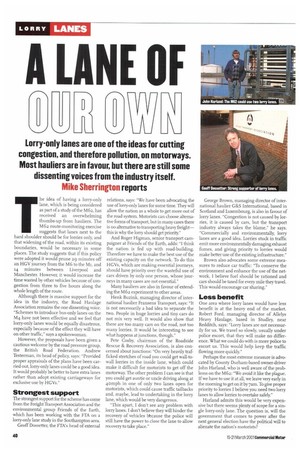A LANE OF
Page 42

If you've noticed an error in this article please click here to report it so we can fix it.
Lorry-only lanes are one of the ideas for cutting congestion, and therefore pollution, on motorways. Most hauliers are in favour, but there are still some dissenting voices from the industry itself. Mike Sherrington reports
The idea of having a lorry-only lane, which is being considered as part of a study of the M62, has received an overwhelming thumbs-up from hauliers. The M62 route-monitoring exercise suggests that lanes next to the hard shoulder should be for lorries only, and that widening of the road, within its existing boundaries, would be necessary in some places. The study suggests that if this policy were adopted it would prune 29 minutes off an HGV journey from the MG to the MI, and 14 minutes between Liverpool and Manchester. However, it would increase the time wasted by other vehides because of congestion from three to five hours along the whole length of the route.
Although there is massive support for the idea in the industry, the Road Haulage Association remains the one dissenting voice. "Schemes to introduce bus-only lanes on the M4 have not been effective and we feel that lorry-only lanes would be equally disastrous, especially because of the effect they will have on other traffic," says a spokeswoman.
However, the proposals have been given a cautious welcome by the road pressure group, the British Road Federation. Andrew Testennan, its head of policy, says: "Provided proper appraisals of the plans have been carried out, lorry-only lanes could be a good idea. It would probably be better to have extra lanes rather than adopt existing carriageways for exdusive use by HGVs."
Strongest support
The strongest support for the scheme has come from the Freight Transport Association and the environmental group Friends of the Earth, which has been working with the FTA on a lorry-only lane study in the Southampton area.
Geoff Dossetter, the FTA's head of external relations, says: "We have been advocating the use of lorry-only lanes for sometime. They will allow the nation as a whole to get more out of the road system. Motorists can choose alternative forms of transport, but in many cases there is no alternative to transporting heavy freight— this is why the lorry should get priority."
And Roger Higman, senior transport campaigner at Friends of the Earth, adds: "I think the nation is fed up with road-building. Therefore we have to make the best use of the existing capacity on the network. To do this HGVs, which are making essential journeys, should have priority over the wasteful use of cars driven by only one person, whose journeys in many cases are not essential."
Many hauliers are also in favour of extending the M62 experiment to other areas.
Henk Buzink, managing director of international haulier Fransens Transport, says: "It is not necessarily a bad idea to separate the two. People in huge lorries and tiny cars do not mix very well. It would also show that there are too many cars on the road, not too many lorries. It would be interesting to see what happens at junctions, though."
Pete Cosby, chairman of the Roadside Rescue 8c Recovery Association, is also concerned about junctions: "On very heavily trafficked stretches of road you could get wall-towall lorries in the inside lane, which could make it difficult for motorists to get off the motorway. The other problem I can see is that you could get auntie or uncle driving along at 4omph in one of only two lanes open for motorists, which could cause traffic tailbacks and, maybe, lead to undertaking in the lorry lane, which would be very dangerous.
"This apart, I don't see any problem with lorry lanes. I don't believe they will hinder the recovery of vehicles htcause the police will still have the power to close the lane to allow recovery to take place." George Brown, managing director of international haulier G8c.S International, based in Scotland and Luxembourg, is also in favour of lorry lanes. "Congestion is not caused by lorries, it is caused by cars, but the transport industry always takes the blame," he says. "Commercially and environmentally, lorry lanes are a good idea. Lorries stuck in traffic emit more environmentally damaging exhaust fumes, and giving priority to lorries would make better use of the existing infrastructure."
Brown also advocates some extreme measures to reduce car traffic: "To conserve the environment and enhance the use of the network, I believe fuel should be rationed and cars should be taxed for every mile they travel. This would encourage car sharing."
Less benefit
One area where lorry lanes would have less benefit is at the heavy end of the market. Robert Ford, managing director of Allelys Heavy Haulage, based in Studley, near Redditch, says: "Lorry lanes are not necessarily for us. We travel so slowly, usually under police escort, that they will make no difference. What we could do with is more police to escort us. This would help keep the traffic flowing more quickly."
Perhaps the most extreme measure is advocated by County Durham-based owner-driver John Harland, who is well aware of the problems on the M62: "We avoid it like the plague. If we have to use it at all, we leave very early in the morning to get on it by 7am. To give proper priority to lorries I believe you need two lorry lanes to allow lorries to overtake safely."
Harland admits this would be very expensive but there seems plenty of scope for a single lorry-only lane. The question is, will the government that comes to power after the next general election have the political will to alienate the nation's motorists?












































































































